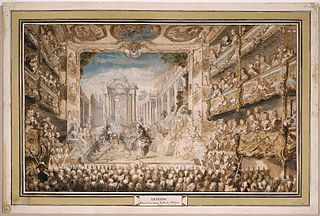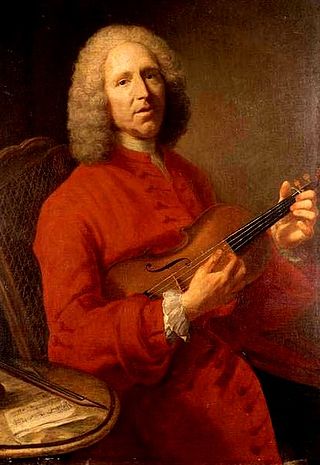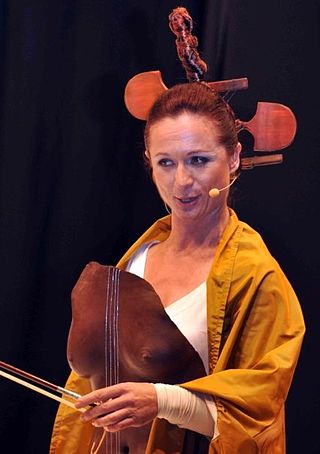
Armide is an opera in five acts by Jean-Baptiste Lully. The libretto by Philippe Quinault is based on Torquato Tasso's poem La Gerusalemme liberata. The work is in the form of a tragédie en musique, a genre invented by Lully and Quinault.

Véronique Gens is a French operatic soprano. She has spent much of her career recording and performing Baroque music.

Les Indes galantes is a ballet héroïque, a type of French Baroque opera-ballet, by Jean-Philippe Rameau with a libretto by Louis Fuzelier. In its final form it comprised an allegorical prologue and four entrées, or acts, each set in an exotic place, the whole being unified around the theme of love. The work dates from 1735 except for the last entrée, which was added the following year. In 1761, however, Rameau dropped the relatively short and mildly contrasted third entrée so as to leave what is now considered the work's definitive form: Prologue; Le turc généreux ; Les incas du Pérou ; and Les sauvages . The dropped entrée was Les fleurs . Famous pieces from Les Indes galantes include the Dance of the Peace Pipe and the Chaconne, both from The Savages of North America.

Les Boréades is a tragédie lyrique mise en musique, or a lyric tragedy put into music, a type of opera, in five acts by Jean-Philippe Rameau (1683-1764). It is the last of his five such works. The libretto, attributed to Louis de Cahusac (1706–1759), is loosely based on the Greek legend of Abaris the Hyperborean and includes Masonic elements; the Boréades are the descendants of Boréas.

Christophe Rousset is a French harpsichordist and conductor, who specializes in the performance of Baroque music on period instruments. He is also a musicologist, particularly of opera and European music of the 17th and 18th centuries and is the founder of the French music ensemble Les Talens Lyriques.
Sandrine Piau is a French soprano. She is particularly renowned in Baroque music although also excels in Romantic and modernist art songs. She has the versatility to perform works from Vivaldi, Handel, Mozart to Schumann, Debussy, and Poulenc. In addition to an active career in concerts and operas, she is prolific in studio recordings, primarily with Harmonia Mundi, Naïve, and Alpha since 2018.

Cadmus et Hermione is a tragédie en musique in a prologue and five acts by Jean-Baptiste Lully. The French-language libretto is by Philippe Quinault, after Ovid's Metamorphoses. It was first performed on 27 April 1673 by the Paris Opera at the Jeu de paume de Béquet.
Don Quichotte chez la Duchesse is a "comic ballet" by the French baroque composer Joseph Bodin de Boismortier. Although it is described as a ballet, it is sung throughout with a libretto by Charles Simon Favart.

Jean-Claude Malgoire was a French oboist and later conductor.

Renaud is an opera by Antonio Sacchini, first performed on 28 February 1783 by the Académie Royale de Musique at the Théâtre de la Porte Saint-Martin in Paris. It takes the form of a tragédie lyrique in three acts. The French libretto, by Jean-Joseph Lebœuf, is based on Cantos XVII and XX of Torquato Tasso's epic poem Gerusalemme liberata and, more directly, on the five-act tragedy by Simon-Joseph Pellegrin, Renaud, ou La suite d'Armide, which had been set to music by Henri Desmarets in 1722 and was intended as a sequel to Lully's famous opera Armide. According to Théodore Lajarte, Lebœuf was helped by Nicolas-Étienne Framery, the regular translator of Sacchini's libretti.

La créole is an opéra comique in three acts of 1875 with music by Jacques Offenbach. The French libretto was by Albert Millaud, with additional material by Henri Meilhac. It was one of three full-length stage works written almost simultaneously that year, the others being La Boulangère a des écus and Le Voyage dans la lune.

Sabine Devieilhe is a French operatic coloratura soprano. She is known for her interpretation of works by Mozart, Baroque music, and 19th-century opera. She is often regarded as a successor to Natalie Dessay.
Jill Feldman is an American soprano who has acquired an international reputation for her interpretation of medieval, baroque and classical repertoires.

Delphine Haidan is a French mezzo-soprano who has performed internationally.
Florence Katz is a contemporary French a mezzo-soprano, graduated from the Conservatoire de Paris, she is also a singing teacher at the Conservatory of Bourg-la-Reine/Sceaux. She specializes in the French repertoire. She is a recipient of the Darius Milhaud Prize.

Isabelle Druet is a French operatic coloratura mezzo-soprano who has performed internationally. She began her career as an actress and co-founded a theatre company, La Carotte. She has performed in concert and recorded with the ensemble Le Poème Harmonique. On stage, she has performed at opera houses in Paris, Nancy, Lyon and Düsseldorf, among others.
Florence Malgoire was a French classical violinist, pedagogue and conductor.
Bernard Deletré is a French operatic bass-baritone.

Jean-Louis Martinoty was a French writer and an opera director.. Renowned for his stagings of baroque operas in the eighties, he was also General Administrator of the Paris Opera (1986–1989).
Marie-Jeanne Larrivée, born Marie-Jeanne Lemière was a French soprano.
![Isabelle Poulenard] (2021) Isabelle Poulenard.jpg](http://upload.wikimedia.org/wikipedia/commons/thumb/9/90/Isabelle_Poulenard.jpg/170px-Isabelle_Poulenard.jpg)












